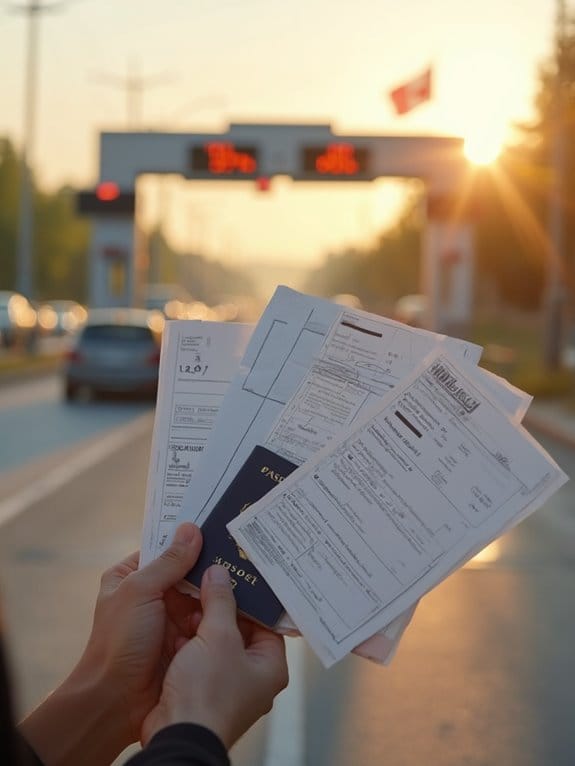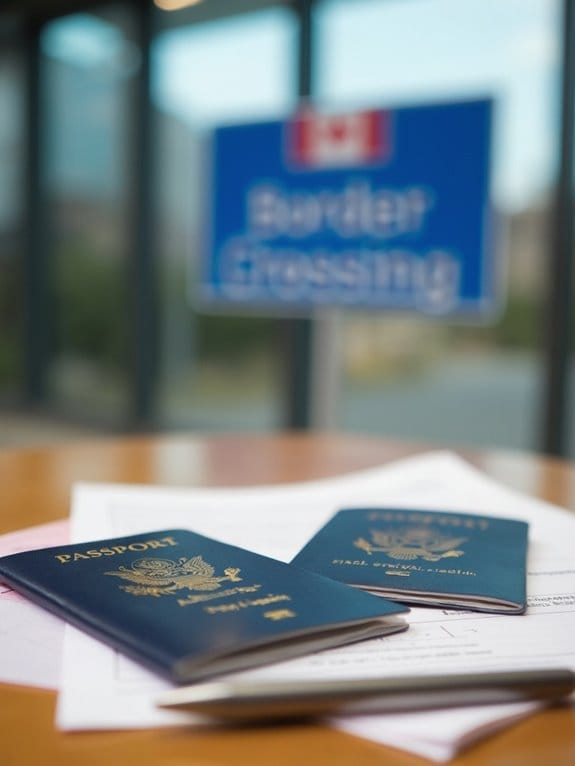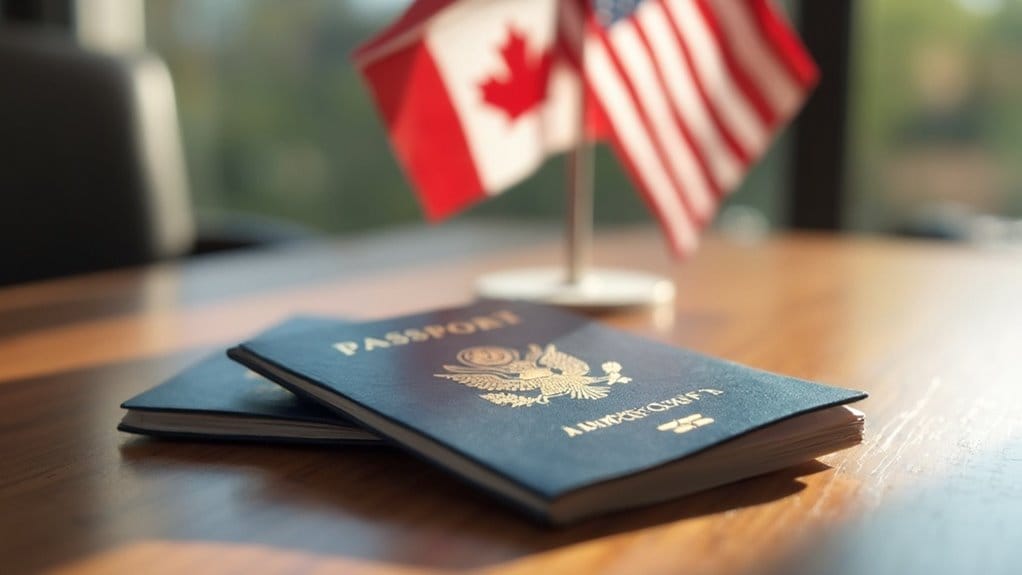When crossing the US-Canada border, you'll need three essential passport tips to breeze through customs. First, keep your passport current and valid for at least six months beyond your travel date – nothing ruins a trip faster than an expired document. Second, if you're traveling with kids under 16, bring their birth certificates or citizenship cards, though having passports for everyone makes life easier. Third, dual citizens should carry passports from both countries to avoid headaches at customs. These basics will get you started, but there's so much more to smooth border crossings than meets the eye.
Key Takeaways
- Ensure your passport is valid with at least six months remaining before expiration to avoid entry complications.
- Keep your passport readily accessible and separate from other documents for efficient border processing.
- Dual citizens must carry passports from both countries when crossing the US-Canada border.
- Children under 16 can use birth certificates, but passports are strongly recommended for hassle-free travel.
- Present your passport, not driver's license, as primary identification when crossing by air, land, or sea.
Standard Travel Documents
Anyone planning to cross the US-Canada border needs specific travel documents, and the requirements vary depending on how you're traveling. If you're flying between these friendly neighbors, you'll need to pack your valid passport or NEXUS card – there's no wiggling around this requirement at airports! For safety reasons, it's crucial to use only recognized border crossings and avoid traveling at night.
For those of you who prefer road trips or boat adventures, you've got more options up your sleeve. If you're 16 or older, you can choose from a valid passport (always a safe bet), a Trusted Traveler Program card (perfect for frequent crossers), or even an enhanced driver's license. And here's a handy tip: if you're First Nations, your Secure Certificate of Indian Status will work just fine.
Don't forget about the kiddos! If you're traveling with children under 16 by land or water, you can breathe a little easier – they can use their birth certificate or Canadian citizenship certificate instead of a passport. Though honestly, I'd recommend getting them passports anyway – it's like having an all-access pass that works everywhere. Trust me, you'll thank yourself later when spontaneous travel opportunities pop up!
Special Cases Documentation

Managing border crossings gets a bit trickier when you're dealing with special circumstances. If you're lucky enough to hold dual citizenship, you'll want to carry both your U.S. and Canadian passports – trust me, it'll save you from those awkward conversations at the border. While it's not technically required by U.S. officials, having both documents in your travel arsenal makes life so much smoother. Having your documents translated into English or French is essential for smooth processing at the border.
Got kids in tow? You'll need to pack more than just their favorite stuffed animals. Make sure they've got valid ID, and if they're traveling solo or with just one parent, don't forget that all-important consent letter. It's like a golden ticket for hassle-free crossing! And here's something you might not think about until you need it: emergency travel documents play by their own rules. If you're stuck with a temporary passport, you'll want to check with your nearest diplomatic mission before packing your bags. Oh, and don't forget to declare those duty-free goodies and gifts – nothing ruins a trip quite like an unexpected customs fee! Your best bet? Keep detailed lists and carry proper medical insurance – because peace of mind is the best travel companion.
Border Crossing Preparations

Armed with the right documents for special cases, it's time to focus on making your border crossing as smooth as possible. You'll want to start by checking the CBSA's hourly wait time updates – trust me, nothing's worse than sitting in a three-hour line when you could've crossed in 30 minutes at a different entry point! For those staying longer, the personal exemption limits increase from $200 to $800 after 48 hours.
Before you hit the road, make sure you've packed all your essential documents – your passport should be your new best friend for this journey. Don't forget to download the handy Canborder app; it's like having a personal border-crossing assistant in your pocket. You'll get real-time updates and mapping services that'll make you feel like a seasoned pro.
If you're bringing Fido along, remember that three-month age requirement and grab that rabies certificate – border officers take pet documentation seriously! And here's a pro tip: use the online duty and tax estimator before you shop. It'll save you from that awkward moment when you realize those "incredible deals" aren't so incredible once you factor in the duties. Keep your vehicle registration current, and if you're traveling with kids, that consent letter is worth its weight in gold.
Frequently Asked Questions
What Happens if My Passport Expires While I'm Across the Border?
Like a fish out of water, you'll face serious complications. You'll need to contact your embassy or consulate immediately for emergency travel documents, as you can't legally cross borders with an expired passport.
Can I Cross the Border if I Have a Pending Criminal Case?
You generally can't cross the border with pending criminal charges. You'll likely be denied entry as US border officials have access to criminal databases and consider those with pending cases inadmissible without proper waivers.
How Long Can I Stay in Canada/Us Without Additional Documentation?
Like clockwork, you'll get 6 months to stay in either country. You don't need extra docs for basic visits, but it's essential you don't overstay. Remember, that's from your entry date in each country.
Do I Need Travel Insurance to Cross the Us-Canada Border?
While you don't legally need travel insurance to cross the US-Canada border, it's highly recommended as your provincial healthcare may have limited coverage abroad and medical expenses can be extremely costly without insurance.
What Identification Is Accepted if My Passport Was Recently Stolen?
If your passport's stolen, you can use an Enhanced Driver's License or NEXUS card for land/water crossings. For air travel, you'll need to get an emergency passport replacement – no exceptions are allowed.





